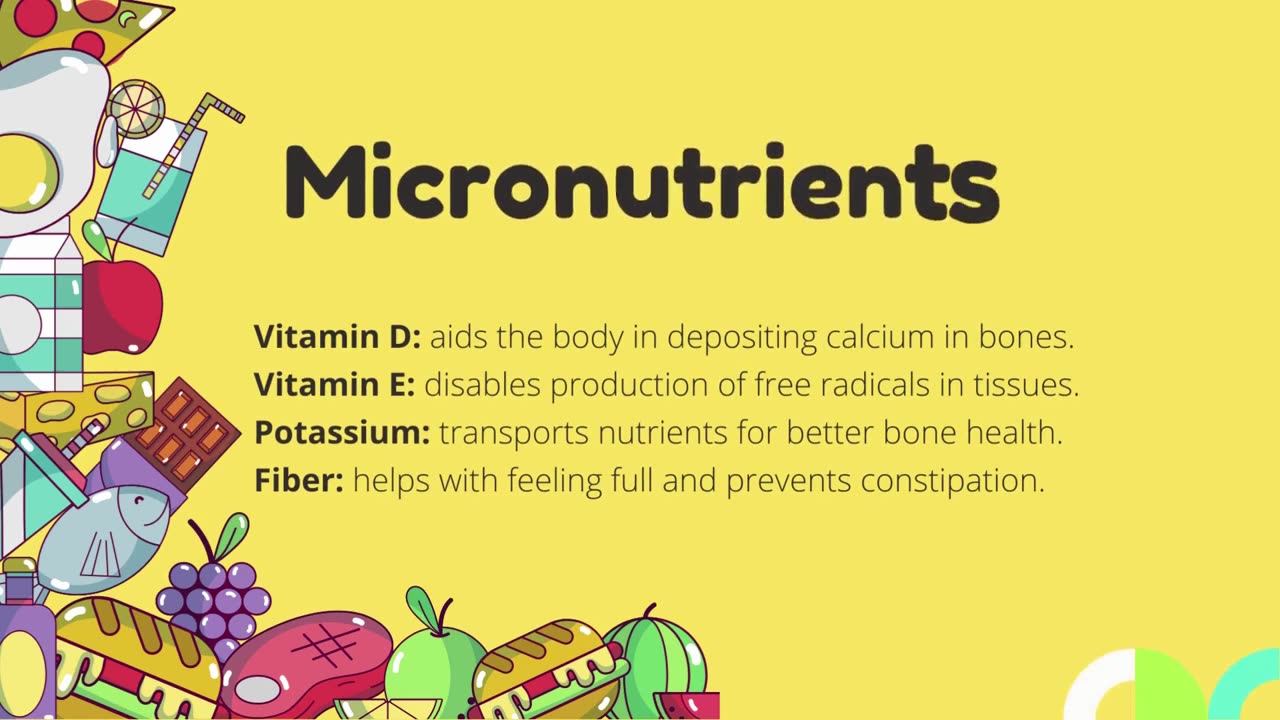Premium Only Content

Nutritions needed for Adolescent
Adolescence is a critical period of growth and development, and proper nutrition plays a crucial role in supporting the physical and cognitive changes that occur during this phase. During adolescence, individuals experience rapid growth spurts, hormonal changes, and increased energy needs. Therefore, it is essential to provide them with a well-balanced diet that meets their nutritional requirements.
First and foremost, adolescents require adequate amounts of macronutrients such as carbohydrates, proteins, and fats. Carbohydrates serve as the primary source of energy and should constitute the majority of their daily calorie intake. Whole grains, fruits, vegetables, and legumes are excellent sources of complex carbohydrates that provide essential vitamins, minerals, and fiber.
Proteins are vital for growth and repair of body tissues, and adolescents need slightly more protein compared to adults. Lean meats, poultry, fish, eggs, dairy products, and plant-based sources like beans and nuts are excellent sources of high-quality protein that should be included in their diet.
While fats often have a negative connotation, they are essential for hormone production, brain development, and absorption of fat-soluble vitamins. However, it is crucial to focus on healthy fats such as those found in avocados, nuts, seeds, and olive oil, rather than saturated and trans fats found in fried and processed foods.
In addition to macronutrients, adolescents require an adequate intake of micronutrients, including vitamins and minerals, to support their overall health. Calcium and vitamin D are particularly important during this stage as they promote bone health and prevent osteoporosis later in life. Dairy products, fortified cereals, leafy greens, and sunlight exposure are excellent sources of these nutrients.
Iron is another crucial mineral that supports growth and development, as well as the formation of red blood cells. Adolescents, especially females, are at a higher risk of iron deficiency due to increased iron needs during menstruation. Including iron-rich foods like lean meats, poultry, fish, fortified cereals, and legumes in their diet can help prevent deficiencies.
Lastly, hydration is often overlooked but is essential for overall health and well-being. Adolescents should aim to drink plenty of water throughout the day to stay hydrated and support their bodily functions.
It is important to note that individual nutritional needs may vary based on factors such as activity level, growth rate, and overall health. Consulting a healthcare professional or a registered dietitian can provide personalized guidance and ensure that adolescents meet their specific nutritional needs.
In conclusion, proper nutrition is crucial for adolescents to support their growth, development, and overall well-being. A well-balanced diet that includes adequate amounts of macronutrients, micronutrients, and hydration is essential during this critical stage of life. By providing adolescents with the necessary nutrients, we can help them thrive and lay the foundation for a healthy future.
-
 33:49
33:49
Quite Frankly
1 day agoThe Christmas Eve Midnight Telethon
128K22 -
 2:12:46
2:12:46
Price of Reason
1 day agoAmber Heard BACKS Blake Lively Lawsuit Against Justin Baldoni! Is Disney CEO Bob Iger in TROUBLE?
77.3K24 -
 1:01:17
1:01:17
The StoneZONE with Roger Stone
23 hours agoChristmas Edition: Why the Panama Canal is Part of the America First Agenda | The StoneZONE
146K52 -
 18:12:15
18:12:15
LFA TV
1 day agoLFA TV CHRISTMAS EVE REPLAY
156K19 -
 13:32
13:32
Scammer Payback
1 day agoChanging the Scammer's Desktop Background to his Location
23.2K6 -
 4:21
4:21
BIG NEM
1 day agoNikola Tesla's Secret to Cultivating Creativity & Genius
17.9K1 -
 15:03
15:03
The Anthony Rogers Show
2 days agoAnthony Rogers - Live at Cusumano's Pizza (Upstairs)
14.2K1 -
 4:33:48
4:33:48
tacetmort3m
1 day ago🔴 LIVE - THE ZONE KEEPS PULLING ME BACK - STALKER 2 - PART 15
77.3K13 -
 22:45
22:45
Brewzle
1 day agoI Went Drinking In A Real Bourbon Castle
54.9K4 -
 48:36
48:36
PMG
2 days ago $5.52 earned"Parkland Parent Speaks Out On Kamala Harris Using Victims"
44.6K12